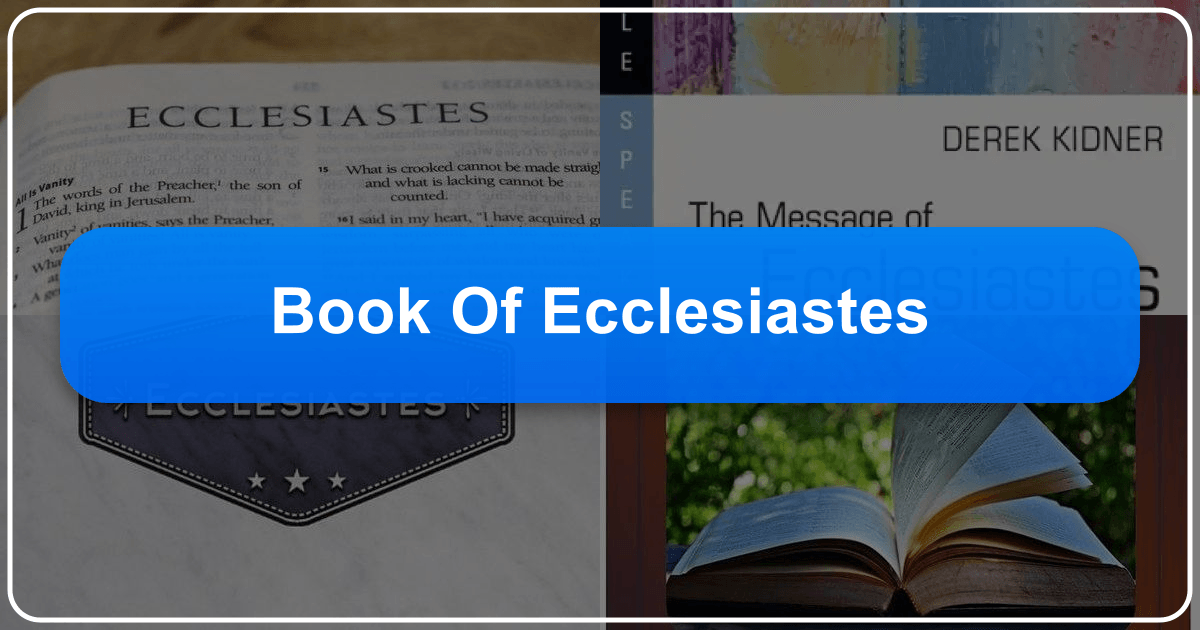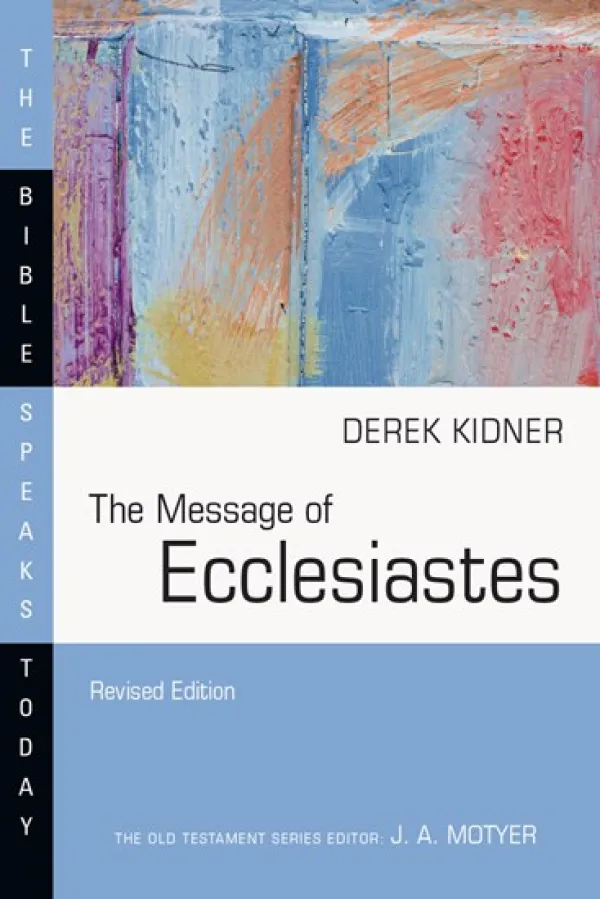The Book of Ecclesiastes: A Comprehensive Exploration

The Book of Ecclesiastes, a profound and often perplexing text within the biblical canon, has captivated and challenged readers for centuries. Its exploration of life’s meaning, the pursuit of happiness, and the ultimate futility of worldly endeavors continues to resonate with contemporary audiences. This exploration delves into the multifaceted nature of Ecclesiastes, examining its authorship, purpose, and enduring cultural impact through the lens of various key themes.
Authorship and Date of Writing
The authorship of Ecclesiastes is a subject of ongoing scholarly debate. While the text itself doesn’t explicitly name its author, numerous internal clues strongly suggest King Solomon as the writer. The wisdom, wealth, and experiences described align remarkably well with Solomon’s life as depicted elsewhere in Scripture. However, certain stylistic and thematic elements have led some to propose alternative authorship, suggesting a post-Solomonic author who may have written centuries later. This perspective points to potential allusions to events following Solomon’s reign. Nevertheless, the prevailing scholarly consensus attributes the book to Solomon, situating its composition toward the end of his reign, around 935 B.C. (See Lbibinders.org for detailed discussions on the authorship and dating of Ecclesiastes).
The Preacher’s Identity: Solomon or a Later Sage?

The debate surrounding the identity of the “Preacher” (or “Teacher”) in Ecclesiastes hinges on a careful analysis of the text. Proponents of Solomonic authorship highlight the parallels between the Preacher’s experiences – his vast wealth, his construction projects, and his pursuit of wisdom – and the historical Solomon. The self-reflective and sometimes disillusioned tone also fits the narrative arc of Solomon’s life, as depicted in other biblical books.
Those who argue against Solomonic authorship often point to discrepancies in style and language. Some scholars suggest the text reflects a later period in Israelite history, incorporating vocabulary and perspectives that wouldn’t have been readily apparent during Solomon’s time. The focus on the limitations of human wisdom and the uncertainties of life, they argue, might be more reflective of a later period of reflection on Solomon’s legacy. Ultimately, the question of authorship remains open to interpretation, with compelling arguments supporting both Solomonic and post-Solomonic authorship. A thorough understanding necessitates considering both viewpoints.
The Purpose of Ecclesiastes: A Search for Meaning
The central purpose of Ecclesiastes is not to offer a straightforward, prescriptive guide to life, but rather to provide a profound exploration of meaning and purpose. The book serves as a poignant reflection on the human condition, as experienced through the lens of “the Preacher.” He recounts his extensive pursuit of worldly pleasures, wisdom, and achievements, only to find ultimate emptiness and disillusionment. This narrative provides a powerful illustration of the inherent limitations of seeking fulfillment solely in earthly pursuits.

Through the Preacher’s experiences, Ecclesiastes underscores the transient nature of earthly pleasures. Wealth, power, wisdom, and even pleasure fail to provide lasting satisfaction. The Preacher’s relentless pursuit of meaning, despite his profound intellect, highlights the inherent inadequacy of human endeavors without a divinely ordained purpose. The book’s ultimate message is that true meaning and lasting satisfaction can only be found in a relationship with God.
The “Vanity” of Worldly Pursuits: A Central Theme
The recurring theme of “vanity” (or “meaninglessness”) in Ecclesiastes emphasizes the fleeting and ultimately unsatisfying nature of worldly pursuits. The Preacher’s exhaustive investigation into various aspects of life – sensual pleasures, intellectual endeavors, material wealth, and even moral codes – reveals their inherent limitations. No matter how diligently one pursues these earthly goals, they ultimately fail to deliver lasting fulfillment. This underscores the essential truth that true meaning transcends the temporal realm.

The phrase “under the sun” is used repeatedly to signify the limitations of the earthly experience. It’s a powerful symbol for the finite and ephemeral nature of human existence, suggesting that true meaning lies beyond the scope of human understanding and achievement. The book doesn’t negate the value of earthly life but rather offers a critical perspective on its inherent limitations, urging readers to seek a higher purpose.
Key Verses and a Brief Summary
Several key verses encapsulate the central themes of Ecclesiastes:
-
Ecclesiastes 1:2: “‘Vanity of vanities,’ says the Preacher, ‘vanity of vanities, all is vanity’” (NKJV). This famous opening verse sets the stage for the book’s exploration of life’s emptiness without God.
-
Ecclesiastes 1:18: “For with much wisdom comes much sorrow; the more knowledge, the more grief.” This verse challenges the naive assumption that wisdom alone guarantees happiness.
-
Ecclesiastes 2:11: “Yet when I surveyed all that my hands had done and what I had toiled to achieve, everything was meaningless, a chasing after the wind; nothing was gained under the sun.” This powerfully sums up the Preacher’s disillusionment with worldly achievements.
-
Ecclesiastes 12:1: “Remember your Creator in the days of your youth, before the days of trouble come and the years approach when you will say, ‘I find no pleasure in them.’” This verse emphasizes the importance of early devotion to God.
-
Ecclesiastes 12:13: “Now all has been heard; here is the conclusion of the matter: Fear God and keep his commandments, for this is the whole duty of man.” This concluding verse presents the ultimate answer: fearing God and obeying His commandments.
The book can be broadly divided into two sections: the first seven chapters detail the Preacher’s pursuit of fulfillment in various worldly realms, all ultimately proving futile. The remaining chapters offer reflections and advice on how to live a meaningful life, emphasizing the crucial role of faith in God as the only source of true meaning and purpose (See Lbibinders.org for in-depth chapter-by-chapter summaries).
Foreshadowings and Practical Application
The seemingly negative tone of Ecclesiastes isn’t an endorsement of pessimism, but rather a setting for revealing the insufficiency of earthly fulfillment. The book anticipates the Christian message of redemption and salvation through Jesus Christ. The “vanities” described in Ecclesiastes are ultimately overcome by the grace and redemption offered through Christ, providing a path to lasting purpose and eternal life.
The practical application of Ecclesiastes for Christians involves several key takeaways. The book allows us to empathize with the despair that can grip those who lack a relationship with God, illustrating the ultimate unsatisfactoriness of worldly pleasures without a spiritual foundation. Moreover, Ecclesiastes serves as a caution against prioritizing earthly pursuits over spiritual devotion, highlighting the importance of remembering our Creator and aligning our lives with His will.
Ecclesiastes and the Christian Life: Finding Meaning in Christ
The message of Ecclesiastes isn’t about rejecting earthly life but about finding its true meaning within the context of our faith in Christ. The disappointments and frustrations described in the book are not merely inevitable aspects of the human experience; they are a testament to the ultimate insufficiency of any pursuit that leaves God out. Christ, therefore, becomes the ultimate answer to the Preacher’s existential questions. He offers not merely temporary solace but eternal hope, fulfilling the longing for lasting meaning that underpins the entirety of the book.
Cultural Impact and Further Study
Ecclesiastes has left an indelible mark on literature and thought, inspiring countless works of art, philosophy, and theological reflection. Its themes of mortality, meaning, and the pursuit of happiness continue to resonate across cultures and time periods. The book’s enduring relevance stems from its honest and unflinching portrayal of the human condition, a search for meaning that ultimately points beyond the boundaries of the temporal world.
For deeper engagement with the book of Ecclesiastes and its profound message, further study is strongly recommended. Exploring various commentaries and scholarly works can provide additional perspectives and insights. Resources like the ESV Study Bible can offer detailed interpretations and relevant cross-references (Visit Lbibinders.org for suggested resources).